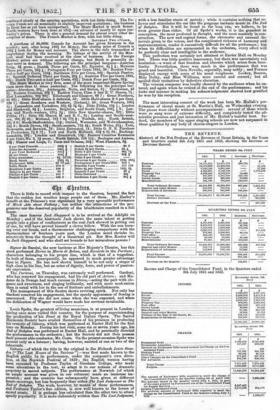Louis Spohr, the greatest of living musicians, is at present
in London ; having once more visited this country, for the purpose of superintending the production of his Faust at the Royal Italian Opera. The Sacred Harmonic Society have availed themselves of his presence in producing has oratorio of Calvary, which was performed at Exeter Hall for the first time on Monday. During his last visit, some six or seven years ago, his Fall of Babylon was performed at Exeter Hall, and he personally directed the performance in the orchestra ; but the Society did not then possess their present able conductor' Mr. Costa. On the present occasion Spohr was present only as a listener; having, however, assisted at one or two of the rehearsals.
• Calvary-of which the title in the original is Des Heilands Lade Stan- den ("The Last Hours of the Saviour 1-was first made known to the English public by its performance, under the composer's own direc- tion' at the Norwich Festival of 1839; the English version having been executed by Professor Taylor of Gresham College, who made some alterations in the text, to adapt it to our notions of dramatic propriety in sacred subjects. The performance at Norwich (of which an ample account was given in our columns) made an immense im- pression; and the oratorio has subsequently been given at different music-meetings, but less frequently than either The Last Judgment or The Fall of Babylon. The work, however, by means of these performances, and Professor Taylor's fine edition, is now well known to the lovers of sacred music. It is perhaps less calculated than the other two to attain speedy popularity. It is more elaborately written than The Last Judgment,
with a less familiar strain of melody ; while it contains nothing that re- lieves and stimulates the ear like the gorgeous barbaric music in The Fall of Babylon. But it will be found in the long run, we believe, to be even greater than either. Of all Spohes works, it is the grandest in conception, the most profound in thought, and the most masterly in con- struction. The new and orginal forms, the chromatic and unusual in- tervals given to the voices, and the complicated richness of harmony and instrumentation, render it excessively difficult for all the performers ; but when its difficulties are surmounted in the orchestra, every effect will be perfectly clear and intelligible to the audience. This perfection was certainly not attained at Exeter Hall on Monday last. There was little positive inaccuracy, but there was uncertainty and hesitation-a want of that freedom and abandon which arises from fami- liarity. Nevertheless, there was much in the performance that was grand and beautifuL Clara Novelle, especially, sang nobly ; and Formes displayed energy with some of his usual roughness. Lockey, Benson, Miss Dolby, and Miss Williams, were caretul and correct ; but all spoiled their recitatives by defective elocution. The veteran composer was loudly cheered by the audience when he en- tered, and again when he retired at the end of the performance ; and his looks and manner in making his acknowledgments showed how gratified he was by his reception.


























 Previous page
Previous page